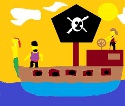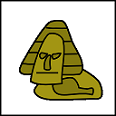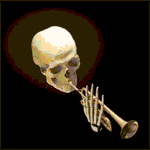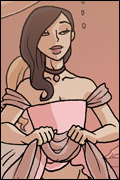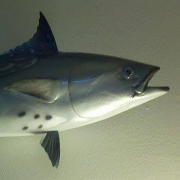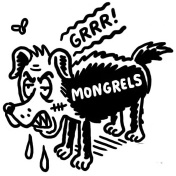|
Themeing question. The next game I plan to publish (its in very early stages) is a card game based on the real world dog sport of Earth Dog. Earth Dog is basically dungeon crawling for terriers and dachshunds. Humans build underground tunnels with traps (not like pit traps but wrong turns, gates they can't get through, and false scent leads) and the dogs have to go through the tunnels as fast as they can to find the real quarry which is a rat in a perforated pvp pipe (for the rat's safety). I can see themeing this one of two ways. 1. I just make it like real world Earth Dog. People raise their dogs, train them, skill them up, and they have to race through tunnels and navigate these traps. Dogs get better at it and after X number of rounds someone wins. 2. I make it more dungeon crawly, but dog themed. Dog's training either themselves or their pups to go through tight dungeons to dig out kobolds and ratmen (or something like that) but in more of a sporting feel and less dungeon crawl murder murder murder. Do either of those immediately jump out as more attractive to you? Also, tonight I will be on the Meeple Syrup show at 9pm EST to talk about Bee Lives and game design for an hour with the show crew if anyone is interested in tuning in! https://www.facebook.com/MeepleSyrup/
|
|
|
|

|
| # ? May 17, 2024 20:22 |
|
what the hell I just watched way too much 'earth dog' video footage I like the second idea more but I feel the first one would make better sense as a game
|
|
|
|
Courier dogs in wartime, or go full anthropomorphic world war 2 with them as like french resistance runners. Could even theme the characters visuals around their breed (snooty posh poodle, smug american golden retriever in a bomber jacket, grizzled veteran frenchie)
Sandwich Anarchist fucked around with this message at 20:20 on Oct 3, 2018 |
|
|
|
What do you folks think is a maximum manageable hand size? I'm building a very rough prototype for this wave beat-em-up game and I'm currently starting people with a 10 card hand. Basically for this run it's just: Players have a 10 card hand, unique to their character. Their cards all have energy values on them. Players can either: discard cards for movement based on their energy, play cards to do actions, or discard a number of cards equal to the Energy cost of a special ability on their player card. When they run out of cards, they can pickup a number of cards based on the energy they choose to lose for the rest of the wave. So they get rid of a 5 energy card, they pickup 5 of the cards from their deck. Get rid of a 1 energy card, only get 1 card back. It'll be tight resource management, and being greedy and trying to pick up some extra score to be the winner could end up getting you and your entire group killed.
|
|
|
|
A lot depends on complexity. There are plenty of traditional playing card games that manage with hands up to 13, but they're very simple and easy to organize and compare. In a complex game with a lot of evaluation on each card people can struggle with half that many cards.
|
|
|
|
Did some play testing on the fast paced 2-4 player brawler I've been talking about. Game still takes about 5 minutes to teach, 5-10m per player to play. Ground out 3 games in just over half an hour. Biggest potential issue, and I talked about this a little already, was that the last turn or two takes as long as the preceding three or four as the resources dwindle and it starts to become clear that the right sequence might deal just enough damage to win. I've noticed this happen in other playtests so I'm a little worried about it; but I don't think it makes the game less punchy or impactful or otherwise diminishes from the experience, if anything I think it evokes the mind games element in a really visceral way. We also talked about variant content; as we used the "suggested starter" setup that uses the two most straightforward characters. One huge thing that came up was that my friend this matchup was a lot better than the one he vaguely remember that used characters that were a little more complex, which I agreed with - initially the matchup I was teaching was based on the first two characters I made, and when that's all you have that's fine, but now that I have 10+ characters at some state of playable I can actually make things easier to learn, so i did. We wrapped up our discussion with some content I wasn't happy about. Out of my 8 characters that are stable design wise, there's one that just doesn't feel exciting (to me), it doesn't have a cohesive hook and feels very bland (to me). Balance-wise, its "fine", which is why I've kept it around. But my friend suggested a couple ways to mix it up that I'm currently thinking on. Hopefully I'll get to do some more playtesting this weekend at a game day this friend is hosting... nesbit37 posted:Themeing question. I would think 1) would make more sense as a follow up after Bee Lives as far as consistent company theme? I like to target <7 for my stuff, but 10 seems manageable to me. Especially with good graphic design/layout/etc to make it easy to have some idea what each card is / kinda does while fanned in your hand. As to AI, what kind of system have you been working on?
|
|
|
|
I am really bad at AI and co-op games in general. I like to design games with multiple paths to victory, but with games that are more coop oriented I need to really work on having one goal to 'win' and having multiple key decisions along the way. I think as a game designer one of my biggest weaknesses is I can scope a really great idea on a macro level, but implementing the micro-components to get that macro to happen is something I really struggle with. I'm still bouncing back and forth on what exactly I want the combat system to be. I'm leaning away from cards as I feel like it is just adding complexity for no reason. A character board with a few special skills along with a reminder about the basic skills (punching, moving, etc) might make more sense. If I go with that, it wold be easier to AI the enemies as they could have specific skills on their own cards, and I could reveal a map location or something like that and have enemies make their way there. As this is really my first attempt at putting AI in a game, I'm wondering if I should maybe focus on the game itself first, and then targeting an AI system that works in that framework?
|
|
|
|
I watched Team Covenant playing a demo of Keyforge and it looked really boring, just like "ahAH, you activated my trap card" level stuff. Even aside from the whole unique deck stuff, the interactions within the game felt really basic and just standard "attack your opponent's threats as they come out" stuff, but in a setting where you can't really confront the meta in a meaningful way. Like it's probably fun to throw some cards down and see what happens with the random decks but the game itself just seems so basic.
|
|
|
|
And that's pretty much what killed my attempt at a co-op game, so I can totally appreciate your position. Sadly I didn't push through and make it work, but I believe you can!  I think a good strategy would be to work on what you know and either come back and do the AI you envision right now later or simplify the AI later to fit the game you make. It'll probably take a lot of revision, but sometimes that's how you get a game good and all that.  e: That's a shame to hear Tek. 
|
|
|
|
Tekopo posted:I watched Team Covenant playing a demo of Keyforge and it looked really boring, just like "ahAH, you activated my trap card" level stuff. Even aside from the whole unique deck stuff, the interactions within the game felt really basic and just standard "attack your opponent's threats as they come out" stuff, but in a setting where you can't really confront the meta in a meaningful way. Like it's probably fun to throw some cards down and see what happens with the random decks but the game itself just seems so basic. I'm curious what kind of tournament setting crops up around it. Collectible games live and die by their tournament scene and if it's as simple as "buy a blind deck and play!" then Keyforge will die hard.
|
|
|
|
For whatever reason yesterday was constantly up and down for Bee Lives. To hopefully combat that for our last few days I have announced a social stretch goal! If we can get to 600 backers before the end of the campaign we'll unlock an additional 6 solo cards! In honor of the spooky nature of halloween, one of them will be a scenario involving zombees and the other ghost bees from hives in a cemetery. Though the ghost bees are made up, zombees are a real thing you can read about here if you like. 600 may seem like a lot of people but looking at our numbers and other campaigns and I am confident we can do it! Just share the kickstarter with friends, bee keeping groups, gamers, educators and anyone interested in STEM education. If it helps, you can also direct them to https://www.beelivesgame.com which will route them to the kickstarter if you need a nicer looking url to share. Spread the buzz! edit: woops, I meant to put this in the kickstarter thread. Since it's here I am just going to leave it unless someone objects, then I'll edit it out. nesbit37 fucked around with this message at 15:46 on Oct 5, 2018 |
|
|
|
al-azad posted:I'm curious what kind of tournament setting crops up around it. Collectible games live and die by their tournament scene and if it's as simple as "buy a blind deck and play!" then Keyforge will die hard.
|
|
|
|
al-azad posted:I'm curious what kind of tournament setting crops up around it. Collectible games live and die by their tournament scene and if it's as simple as "buy a blind deck and play!" then Keyforge will die hard. It is exactly that, yes. If a deck is too good <how that is determined is unclear> then it is hindered, or outright banned. If a card is deemed broken, it is banned and any deck with it is instantly banned. The unique game idea is really cool, and their second attempt (The co-op game with a different setup in each pack) seems really interesting. It seems like a style of game that strongly benefits from coop vs competitive. That said, it feels like a unique game is also a huge crutch for balance. You don't need to balance anything if the odds of it are appearing are super low. Just make sure your mechanics are good and everything else kinda goes out the window
|
|
|
|
If I spent $20 at a tournament and was immediately banned because my blind box had an infinite combo configuration I would demand a refund and post on every internet forum the game was garbage. I don't see Keyforge surviving as a casual game because casual players are one-and-done, they're not the type who buy multiple items of the same product. I don't see the game surviving with a tournament scene because there's no refinement to the game. Everything is unique and incompatible! I could see game modes like partner play requiring you to identify the weaknesses of your collective decks. But what is the end goal for Keyforge? Where do you go with a collectible game that has no real incentive to collect? e: I'm now realizing this is the design thread, not the general thread.
|
|
|
|
Kashuno posted:I am really bad at AI and co-op games in general. I like to design games with multiple paths to victory, but with games that are more coop oriented I need to really work on having one goal to 'win' and having multiple key decisions along the way. I think as a game designer one of my biggest weaknesses is I can scope a really great idea on a macro level, but implementing the micro-components to get that macro to happen is something I really struggle with. Personally, I think you're going to want some cards. Gloomhaven has obsoleted the "you get to move and shoot, or you can spend a token to move-and-shoot" model - the card economy opens up all sorts of interesting design space, and makes for interesting decisions on every turn. To be clear, you don't have to be as complicated as Gloomhaven; something like Century: Spice Road demonstrates how you can really strip down that same mechanic and still have an interesting (and dead simple, and brisk) game. In terms of AI, I think a good point of reference is Slay the Spire. The enemy AI is trivial (enemies have ~3 things they do, and each turn pick one of the 2 things they didn't do last turn), but the enemies vary in a few important ways such that the game rewards a variety of different play styles. I think the important thing for a board game is not having the AI take a long time to manage.
|
|
|
|
jmzero posted:Personally, I think you're going to want some cards. Gloomhaven has obsoleted the "you get to move and shoot, or you can spend a token to move-and-shoot" model - the card economy opens up all sorts of interesting design space, and makes for interesting decisions on every turn. To be clear, you don't have to be as complicated as Gloomhaven; something like Century: Spice Road demonstrates how you can really strip down that same mechanic and still have an interesting (and dead simple, and brisk) game. While I'm all about cards in games and cards as games I don't think you have to use cards for abilities to have nuanced abilities, it is different design space though to be sure, so I think I get your argument. And having never looked into Slay the Spire, I can see how that could be very clever.
|
|
|
|
jmzero posted:Personally, I think you're going to want some cards. Gloomhaven has obsoleted the "you get to move and shoot, or you can spend a token to move-and-shoot" model - the card economy opens up all sorts of interesting design space, and makes for interesting decisions on every turn. To be clear, you don't have to be as complicated as Gloomhaven; something like Century: Spice Road demonstrates how you can really strip down that same mechanic and still have an interesting (and dead simple, and brisk) game. I moved away from cards for two reasons: I was concerned about working the AI around that system (which I've decided will be a point of concern for later), and I was nervous about encroaching a bit too close on the gloomhaven territory. That said, the cards do open some good space, specifically around the energy mechanic I had described previously. A character with a good amount of high energy low damage cards can be peppering out a lot of smaller damage, while being able to recover more cards at a time for less cards because of their high energy. Meanwhile, a powerhouse character could have cards that do massive damage, but are very low energy. That way, they can absolutely murder things in 1-2 hits, but they have to spend significantly more resources to recover cards.
|
|
|
|
Kashuno posted:That said, the cards do open some good space, specifically around the energy mechanic I had described previously. A character with a good amount of high energy low damage cards can be peppering out a lot of smaller damage, while being able to recover more cards at a time for less cards because of their high energy. Meanwhile, a powerhouse character could have cards that do massive damage, but are very low energy. That way, they can absolutely murder things in 1-2 hits, but they have to spend significantly more resources to recover cards. Yeah - that sounds super good to me.
|
|
|
|
al-azad posted:If I spent $20 at a tournament and was immediately banned because my blind box had an infinite combo configuration I would demand a refund and post on every internet forum the game was garbage.
|
|
|
|
Hello board game friends. I'm looking for some people to help me do some random-assortment-of-people-I-dont-know tests on my game, Distant Planets. It would be over TTS, some time EST over this next weekend/week (depending on schedules). This isn't super formal, but the game is in the balance pass phase, and has been played a lot already, so don't worry about 'oh gently caress I'm changing the rules mid game.' It's a co-operative worker placement/resource management game somewhere between Surviving Mars, Lords of Waterdeep, and Powergrid (so I'm told). Rule link is here, but obviously that doesn't show the actual cards/etc.  I need 4 people per test, so if you have a group you play with that would be cool too. Games take between 45 and an hour or so, a bit longer for first play. Let me know in thread or PM me!
|
|
|
|
jmzero posted:Yeah - that sounds super good to me. I think if I go this route I need to think about how to disconnect energy from movement distance. Right now you can move a distance equal to the energy value of a card, but I am worried that could end up restrictive. If low energy cards are always slow to move and recover few cards, I think the design space ends up pretty restricted. Basically at that point they need always be heavy hitters to off-set everything else about them, but I'd like to have the design space to make cards that allow players to move fast, hit hard, but maybe recover very little or something like that.
|
|
|
|
Hm, so Iíve worked out a combat system and a general game idea (beat up Bad Dudes and get a boss tonappear, beat him up to beat a wave and then continue to a next Ďlevelí) but Iím worried my game doesnít have enough to *do* in it. Like, youíre managing your card economy, and trying to defeat enemies. There are also pickups on the map that you can break to get either additional money or cards for your hand. You can buy cards for your hand from a shop. But thatís kinda it? Iím feeling like Iím missing a real hook for the game. Maybe the combat is too simple at the moment and thatís why it feels like it is missing things, or maybe it is missing something extra to do other than just beat stuff up. Do most dungeon crawlers live and die by their combat systems and loot drops?
|
|
|
|
Kashuno posted:Hm, so Iíve worked out a combat system and a general game idea (beat up Bad Dudes and get a boss tonappear, beat him up to beat a wave and then continue to a next Ďlevelí) but Iím worried my game doesnít have enough to *do* in it. Sounds good to me. I'd suggest making the iterations short so you're having quick fights, getting new cards and back into a new fight quickly. The fights don't have to be super thinky if the "character building" has interesting choices, good variety, and you're getting enough shots at it that you're in control of your destiny. Your map/enemy/setup/card variety seems pretty key too. You want setup to be quick, but also the ability to throw a lot of different angles at the player. For a while I was thinking about doing a game like this where the maps (and other stuff for the scenario, like monster stats) are in a coil-back book (not, like, the book tells you how to build a map, but you actually put your dudes on the pages). jmzero fucked around with this message at 21:19 on Oct 12, 2018 |
|
|
|
So here's where things stand at the moment. There are a number of characters you can play as (2 currently) that have unique stats. Health, Speed, and hand size. In addition, all characters have two special abilities with an associated energy cost. Each character has a unique deck. Players choose up to two cards from their hand every turn; one for movement and one for an action, or they can choose to perform a special action by discarding any number of cards that give them the required energy. Players can move a number of spaces equal to the energy on the card multiplied by their speed stat. Players can move and perform an action in any order. Players recover cards by losing a number of cards with total energy equal to the cards they recover (for example, if they lose a single card with 5 energy they can recover 5 cards). Players can purchase new cards from a few shops on the map. Capturing certain spaces on the map can give benefits as long as players control the space (for example. +1 energy). At the end of a level, the player refills to their hand size. If they own more cards than their max hand size, they may leave some in their discard. This way, they will have more opportunity to recover cards as things go on. Enemies are spawned from a 'level' deck. each 'level' flips over a certain number of cards by character count. They will spawn enemies, breakables around the map, and events that occur. Each deck also contains one Boss who spawns at the end of their respective level. Each level gets increasingly tougher, with more enemies around the map as enemies spawn from their respective level decks as well as from the decks for previous levels. Enemies have 3 abilities on their cards; each turn they perform one of the actions they didn't perform the turn prior. After X levels (5 currently), the game ends. If a player is killed by enemies or completely runs out of cards to play, they lose a life refill their hand to their hand size and continue play at the respawn. The team collectively has #of players + 1 lives. If all lives are lost, the players lose.
|
|
|
|
After putting the idea into the L99 survey and realizing it will never happen, I kind of want to start hammering together a solo/sorta-coop game inspired by Torchbearer, Darkest Dungeon, and the like. I'm still baking ideas, but I want it to hit somewhere between press your luck, One Deck Dungeon (et al) and Robinson-Crusoe-but-not-bad. Edit: I think the best way to handle it is a bit of a macro view. Focused more on the big picture/the whole village, where the dungeon delves essentially auto-resolve once they start. Like Galaxy Trucker except instead of real-time ship-building, you get AP as you try to figure out whether to pack a shovel or more food. girl dick energy fucked around with this message at 22:25 on Nov 11, 2018 |
|
|
|
Been thinking about how to handle time travel in this format. It's been nagging at me for a few days and I think I came up with a framework, but my sketched-out board looks more like a spreadsheet and I want to narrow the focus down away from epic world-altering events. A simple ("simple") ten-minute time travel romp. The premise here is that since you're from the future, you're a privileged observer: anything you are present for (have observed) is locked into happening. You get ten turns of future-time to be in the right places at the right times to ensure the outcome of the event you're trying to have happen. The competing players are trying for their own sets of Things To Have Happen, and should generally just get in each others' way and cause problems by observing things at inopportune times. Each player would get ten numbered tokens to indicate where and when they are in the timeline, which currently has five locations and ten times. They'll place or remove object tokens at locations and times by moving around physically or timejumping (which will most likely be limited in specific ways) back or forward with the caveat that at the end of ten future-time turns they zap back to their own time and things resolve. Events require certain combinations of objects or other events to have or not have happened in order to play. I'm figuring stuff will have to be set up, but by necessity will have an opportunity for other players to mess with carefully-laid plans. If you can get an event out, it'll retroactively observe certain things prior and lock in parts of the timeline. Mostly I'm playing around with the idea here so far. It'll live and die by scenarios, so I suppose I'd have to come up with some fun interlocking ones. I'm also sure something like this is already done, but I just haven't played enough of what's out there to know.
|
|
|
|
Have you played Chrononauts? I like how that handled time travel.
|
|
|
|
PMush Perfect posted:Have you played Chrononauts? I like how that handled time travel. Haha, disliking the linchpin/ripple mechanic was what led me down this path. It's so binary. I feel like there's more to explore in that space.
|
|
|
|
How would I go about getting an art designer type to take a look at my design and mock up something that looks halfway decent? I don't really want to show it off yet because it's basically just a spreadsheet, and it should be converted into something more appealing-looking. I'd be willing to pay a bit and I posted in the Creative Convention thread but I don't know how else to connect with artists.
|
|
|
|
You really need to fill the role of art director, or hire one. You can't just hire an artist, hand them a spreadsheet, and say have at it. Also, are you looking for graphic design or art right now? I can't quite tell which would be better for you at your current stage from what you described.
|
|
|
|
I have what I think is a really stupid question but I'm just hoping to get some opinions from others. So I don't really know what the genre as a whole is called, but there are those mystery/puzzle tabletop games that can pretty much only be played once and then you have to wait until you either forget the solution or you just sell it and move on. Games like this that come to mind are things like Sherlock Holmes Consulting Detective, Exit: The Game, and Unlock!, though there are no doubt others that I just can't think of right now. My experiences with Exit and Unlock! are that they are focused around more of an adventure game-y style of puzzle, with a largely linear path going through the game, and I haven't played Consulting Detective but my understanding is that it is a much more open experience, far less guided, giving you access to lots of potential leads to follow and asking the player(s) to determine which ones are notable and important enough to help them in solving the crime. If my interpretation of what Consulting Detective is is way off then please let me know. I'm just wondering what people think would be harder to create, a puzzling mystery that is very hands-off in its approach where the task is to get the player(s) to figure out on their own what may or may not be clues so that the players can try to solve the mystery, or if people consider it harder to design more of a funhouse-style adventure where you have a very specific starting and ending point and the game has very specifically curated puzzles for you to encounter at specific points in the game. I'm just curious what opinions people would have when comparing those 2 types of games and their design process.
|
|
|
|
FirstAidKite posted:I have what I think is a really stupid question but I'm just hoping to get some opinions from others. A game like SHCD is 90% writing an interesting story (and usually they don't) - something closer to writing a screenplay for a TV crime show than a board game. One could imagine a game like this being very intricately designed such that you could approach the mystery in lots of different ways and have them all play out reasonably as the game carefully manages possible states - but I've never played one that bothers with this. Instead, there's a main path with shallow branches (which often lead to the same answers as random punishment). Then there's some red herrings/dead ends to punish you for looking at superfluous details. Very few have puzzles of any note, and only the best have any sort clever twist or anything interesting to be figured out. One of these could be very hard to design - and very satisfying to play - but most are just conventional crime stories chopped up into haphazard bits. The "escape room" type games (both "real life" and "board game") have universally terrible/thin writing, and live and die based on their puzzles (and, to a lesser extent, their "set pieces", though most board games are very constrained in this regard). Most of these puzzles are banal "lateral thinking", finding hidden doodads, or dumbed down reskins of classic puzzles. The best of these have one or two good puzzles or fun discoveries. Designing interesting puzzles is apparently hard enough that nobody has chosen to waste many good ones on board game buyers. They also all seem deathly afraid of including a mechanically challenging puzzle (beyond the simplest "logic-puzzle" style stuff). I think there's probably a market for a more tough+fair puzzle-experience game (think "The Witness" video game, maybe) if someone had the puzzle design chops to make one. One could also imagine a game blending both sorts of experiences (good puzzles and strong narrative) but I haven't seen one that works (eg. TIME STORIES kind of wants to do both, and throw in some dice rolling, and fails in all directions). Detective: Modern Crime is another newish attempt at a gamey-mystery, and (so far) it fails on both sides as well.
|
|
|
|
Most good board game-ish puzzles seem to disappear into ARGs, where the designers can be sure that someone will find the correct answer just from sheer numbers.
|
|
|
|
jmzero posted:A game like SHCD is 90% writing an interesting story (and usually they don't) - something closer to writing a screenplay for a TV crime show than a board game. One could imagine a game like this being very intricately designed such that you could approach the mystery in lots of different ways and have them all play out reasonably as the game carefully manages possible states - but I've never played one that bothers with this. Instead, there's a main path with shallow branches (which often lead to the same answers as random punishment). Then there's some red herrings/dead ends to punish you for looking at superfluous details. Very few have puzzles of any note, and only the best have any sort clever twist or anything interesting to be figured out. One of these could be very hard to design - and very satisfying to play - but most are just conventional crime stories chopped up into haphazard bits. The problem I could see with having quite difficult puzzles is that nobody wants to just sit around in silence while another player tries to solve a puzzle. Even if the puzzles require multiple people, eventually one will finish first. Then either they sit and wait for player 2 to finish, or they solve the puzzle for them and then player 2 is sitting there watching player 1 solve it. You can design puzzles where players work together to solve them, but that's really heavily relying on players doing what you want them to with very little mechanical encouragement to do so.
|
|
|
|
Ahhhhh why didn't I find this thread sooner. It just hit me that TG would probably have a board game design community. I've been shopping my prototype around publishers for the past two years to no avail, but most recently with AEG for their Big Game Night 2020 Women Game Designers theme. Hoping for the best there, but might end up Kickstarting myself in the next year.
|
|
|
|
Mind sharing what the prototype concept is? Everyone here is always eager to hear about goongames!
|
|
|
|
|
So I came up with this idea a while back about a game about losing. Except I wanted losing to be more than just winning with a lower score golf style. I wanted a game where you felt like you were trying to lose, but by doing so you won. Both the feel of winning and losing all at once. I have no idea if I accomplished that goal, but did come up with an amazingly fun blind-hand (the mechanic Hanabi and Bomb Squad uses) trick taking game where you're trying not to win any tricks based on what little information you have about your own hand. All wrapped up in a cute theme about dogs and capitalism  https://walkingdoggos.com is my terrible placeholder site with a sell sheet. Frozen Peach fucked around with this message at 14:06 on Nov 30, 2018 |
|
|
|
That sounds super cool. Have you ever played losers chess or the like? (trying to lose all your pieces, you must take a piece if you can, you choose which if you can take more than one)
|
|
|
|
|
silvergoose posted:That sounds super cool. Have you ever played losers chess or the like? (trying to lose all your pieces, you must take a piece if you can, you choose which if you can take more than one) I can't play normal chess. I can't imagine having to think about how to play losers chess, but I've heard of it. It's definitely close to the feeling I was trying to get out of my design.
|
|
|
|

|
| # ? May 17, 2024 20:22 |
|
I took the plunge and made the decision to attempt to self publish using The Game Crafter. It started as an experiment to see if I could put together a good prototype for pitching and demoing, but now I've pretty much decided to just run with it. My game's first copy is in production at the facility right now, and in roughly 10 days, assuming I like the results, I can make it live for sale. In preparation I've put everything up on Board Game Geek (though my designer credit hasn't been approved yet, nor have the links to the official site and store). I'm super excited right now, and super anxious about seeing the produced copy. https://boardgamegeek.com/boardgame/266382/walking-doggos
|
|
|






